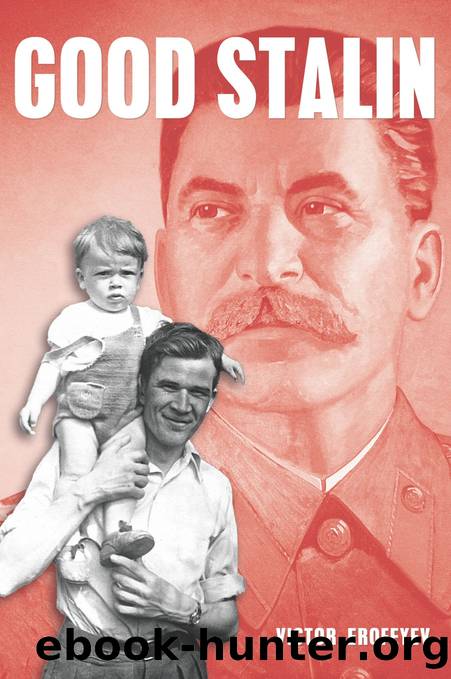Good Stalin by Unknown

Author:Unknown
Language: eng
Format: epub
ISBN: 0000000000000
Published: 2021-10-23T08:31:21+00:00
* * *
Why do writers write autobiographies? If you ask me, itâs a serious affliction. Itâs like carving your initials into a bench. The writerâs task consists in not writing an autobiography, in evading this task, in feeding it to the fishes. Gorky filled his autobiographical trilogy with kilometers of dialogue, each one as plausibly realistic as it is false. The leaden abominations of Russian life are sold for a hundred pounds of bitterness. There is nothing revolutionary about this grief: it is like Sologubâs conundrum. Zero equals zero. Nabokov, on the other hand, maintains that he lived in paradise. For him, this paradise consisted of the vainglorious details of the sated life of an egotistical young lord, whom the revolution later took great pleasure in punishing. Nabokov struggles to try and find the rhythmical cycles in his life, and strikes matches in order to celebrate its meaning, but, being an agnostic, he falls into the trap that he himself has set, and goes off on a tangent. His flight from chance is like a slalom. He comes across as disgustingly pleased with himself in his memoirs. It is the very vulgarity on which he had declared war. Gorky and Nabokov represent the two poles of Russian literature: they turned their autobiographies into an identical product â verbal diarrhea.
The life of the writer flies in the face of the meaning of life. It is not sustained by a million details, like other peopleâs lives. Unlike the writerâs words, it is smaller than the writer. It has a reductive effect on him. His metamorphoses are of interest only as an example of pure suffering. It is an unreliable account, and treachery is its abode. Dostoyevsky dedicated the epitaph on his motherâs grave to the torn-off 'memberâ of the useless hero:
Rest in peace, dear remains,
Until the joyful morn.
That is our only salvation. Whatever a writer does, he merely wastes his time. Unworthy of himself, he consists of nothing but wasted time. He befriends revolutionaries then becomes a hermit; he flies into a rage, then grows calm; he is eternally indebted to his parents, whom he doesnât understand; he pours tenderness over his head, like fir trees: all this is childish babble. When painting his portrait of the artist as a young man, Joyce got so carried away by the subject of sanctity and lust that he forgot about the most important thing of all: the fact that the writer is neither lusty nor saintly. He is a sheet of paper. Otherwise he amounts to nothing more than perpetual masturbation.
Hastily changing into the clothes of his double, Bunin torments the reader with an endless description of nature, which he links to his childhood: millions of sunsets, roads covered by blizzards, the moon above the fields. But his greatest talent is for incredibly vivid descriptions of dead bodies in coffins. His neighbor, his father, a great prince, a child â all of them deceased. All the signs of their decay: the color of their
Download
This site does not store any files on its server. We only index and link to content provided by other sites. Please contact the content providers to delete copyright contents if any and email us, we'll remove relevant links or contents immediately.
| France | Germany |
| Great Britain | Greece |
| Italy | Rome |
| Russia | Spain & Portugal |
Fanny Burney by Claire Harman(26603)
Empire of the Sikhs by Patwant Singh(23086)
Out of India by Michael Foss(16853)
Leonardo da Vinci by Walter Isaacson(13336)
Small Great Things by Jodi Picoult(7143)
The Six Wives Of Henry VIII (WOMEN IN HISTORY) by Fraser Antonia(5515)
The Wind in My Hair by Masih Alinejad(5095)
A Higher Loyalty: Truth, Lies, and Leadership by James Comey(4964)
The Crown by Robert Lacey(4817)
The Lonely City by Olivia Laing(4802)
Millionaire: The Philanderer, Gambler, and Duelist Who Invented Modern Finance by Janet Gleeson(4478)
The Iron Duke by The Iron Duke(4356)
Papillon (English) by Henri Charrière(4274)
Sticky Fingers by Joe Hagan(4199)
Joan of Arc by Mary Gordon(4110)
Alive: The Story of the Andes Survivors by Piers Paul Read(4033)
Stalin by Stephen Kotkin(3966)
Aleister Crowley: The Biography by Tobias Churton(3640)
Ants Among Elephants by Sujatha Gidla(3467)
